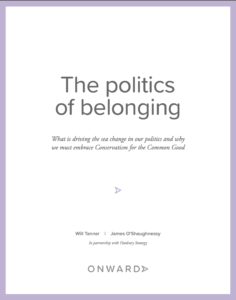Today’s report out from Onward on the ‘Politics of Belonging’ has received widespread coverage and rightly so: the central idea that our society isn’t now clamouring for more freedom, but more security, is spot on.
 It’s striking how Will Tanner and James O’Shaunessy, the report’s authors, have presented what is really an existential question that goes to the heart of the culture wars (more freedom or more belonging?) in think tanky terms that the media feel comfortable talking about. It’s based on polling, talks about voters’ needs rather than bemoaning the ills of society, and is presented by Onward, an outfit that is considered safely ‘soft centre-Right’.
It’s striking how Will Tanner and James O’Shaunessy, the report’s authors, have presented what is really an existential question that goes to the heart of the culture wars (more freedom or more belonging?) in think tanky terms that the media feel comfortable talking about. It’s based on polling, talks about voters’ needs rather than bemoaning the ills of society, and is presented by Onward, an outfit that is considered safely ‘soft centre-Right’.
Their approach is an important part of the answer to the biggest challenge of so-called ‘post-liberal’ thinking: how can you argue for a tilt away from untrammelled Liberalism without sounding like a crazy regressive authoritarian? The moment it starts sounding like you are arguing for ‘less freedom,’ people run a mile – and, understandably, women and minorities are first out the door.
Which leads me to the first of two points I would raise with this otherwise excellent report: as UnHerd’s editor Sally Chatterton pointed out, there’s almost no mention of women. ‘Workington Man’ is an appealing archetype, but what about Workington woman? The data is analysed by age, income, region, but I can’t find the gender split anywhere… was there one? What did it show? There is a reason why Jordan Peterson’s fans are overwhelmingly men: women have done well out of Liberalism, and so tend to be less gung-ho about criticising it.
Then there’s the question of nostalgia. The report’s authors conclude:
I’m not so sure. Nostalgia has become one of the taboos of our political age: it’s remarkable how even Nigel Farage bends over backwards to avoid the accusation of Brexit being a nostalgic movement. The Brexit Party policy agenda is therefore all about gigabit broadband and innovation, yet you can be pretty certain that a lot of Brexit voters don’t even know what gigabit broadband is.
What’s wrong with nostalgia? Etymologically speaking it is the desire to come home, which seems very close to the desire for ‘cultural security’ this report talks about. It’s an instinct which everybody feels, nothing to be embarrassed about – from the literal problem with home-ownership to the wider issue of wanting to feel ‘at home’ in your society, it is actually rather an instructive term. I suspect the change that 58% of those respondents voted to endorse was in part a change away from the emptiness of the modern moment to a more meaningful life. Is that change backwards or change forwards?








Join the discussion
Join like minded readers that support our journalism by becoming a paid subscriber
To join the discussion in the comments, become a paid subscriber.
Join like minded readers that support our journalism, read unlimited articles and enjoy other subscriber-only benefits.
Subscribe